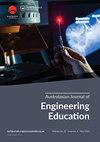How the COVID-19 pandemic reshaped demographic variation in mental health among diverse engineering student populations
Q1 Social Sciences
Australasian Journal of Engineering Education
Pub Date : 2022-07-03
DOI:10.1080/22054952.2023.2184912
引用次数: 1
Abstract
ABSTRACT Mental health issues have long posed a challenge on university campuses. While no population is immune, research has shown that students from marginalised backgrounds can have higher rates of mental health issues and suffer worse outcomes as a result. These discrepancies have been attributed to everything from different cultural norms to the micro-aggressions and other barriers that students from marginalised populations face on university campuses. With the onset of COVID-19 in the United States, many residential universities switched to a remote learning model, fundamentally changing the relationship between students, campus, family support. This work uses survey data from students in the United States to explore how COVID-19 affected mental health issues among students from different backgrounds. While the pandemic drastically increased rates of depressive disorder among all respondents, discrepancies between mental health rates for women and Hispanic/Latinx compared to men and White respondents either decreased or disappeared. Additionally, respondents identifying as Asians were less likely to screen positive for several mental health conditions than White, Non-Hispanic respondents. These findings may point to important new insights about the ways in which engineering education undermines some groups’ mental health.2019冠状病毒病大流行如何重塑不同工程专业学生群体心理健康的人口统计学差异
心理健康问题一直是困扰大学校园的一大难题。虽然没有人能幸免,但研究表明,来自边缘背景的学生患心理健康问题的比例更高,结果也更糟。这些差异被归因于各种各样的因素,从不同的文化规范到来自边缘群体的学生在大学校园中面临的微侵犯和其他障碍。随着新冠肺炎疫情在美国爆发,许多寄宿大学转向远程学习模式,从根本上改变了学生、校园、家庭支持之间的关系。这项工作使用来自美国学生的调查数据来探索COVID-19如何影响来自不同背景的学生的心理健康问题。虽然这一流行病大大增加了所有答复者中抑郁症的发病率,但与男性和白人答复者相比,妇女和西班牙裔/拉丁裔人的精神健康发病率之间的差异减少或消失了。此外,与白人、非西班牙裔受访者相比,被认为是亚洲人的受访者在几项心理健康状况筛查中呈阳性的可能性更小。这些发现可能为工程学教育如何损害某些群体的心理健康提供了重要的新见解。
本文章由计算机程序翻译,如有差异,请以英文原文为准。
求助全文
约1分钟内获得全文
求助全文
来源期刊

Australasian Journal of Engineering Education
Social Sciences-Education
CiteScore
6.40
自引率
0.00%
发文量
8
 求助内容:
求助内容: 应助结果提醒方式:
应助结果提醒方式:


